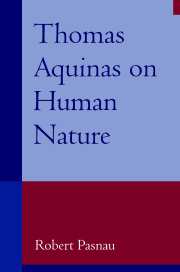Book contents
- Frontmatter
- Contents
- List of Abbreviations
- Acknowledgments
- A Note to the Reader
- Introduction
- PART I ESSENTIAL FEATURES (QQ75–76)
- PART II CAPACITIES (QQ77–83)
- PART III FUNCTIONS (QQ84–89)
- 9 Mind and image
- 10 Mind and reality
- 11 Knowing the mind
- 12 Life after death
- Epilogue: Why Did God Make Me?
- Notes
- Bibliography
- Appendix: Outline of the Treatise (ST 1a 75–89)
- Index
10 - Mind and reality
Published online by Cambridge University Press: 05 June 2012
- Frontmatter
- Contents
- List of Abbreviations
- Acknowledgments
- A Note to the Reader
- Introduction
- PART I ESSENTIAL FEATURES (QQ75–76)
- PART II CAPACITIES (QQ77–83)
- PART III FUNCTIONS (QQ84–89)
- 9 Mind and image
- 10 Mind and reality
- 11 Knowing the mind
- 12 Life after death
- Epilogue: Why Did God Make Me?
- Notes
- Bibliography
- Appendix: Outline of the Treatise (ST 1a 75–89)
- Index
Summary
The object of intellect is the quiddity or common nature of physical objects. Despite the metaphysical difficulties, Aquinas must locate these quiddities within particular material substances (§10.1). The intellect grasps the essential features of substances through information acquired from the senses, but Aquinas's empiricism is tempered by his appeal to a form of divine illumination (§10.2). Although the possible intellect starts out as a blank slate, the agent intellect reveals the natures of things through abstraction. On inspection, the role of agent intellect turns out to be obscure, and abstraction rather mysterious (§10.3). But a clear understanding of the different forms of universality shows how Aquinas's account is genuinely explanatory (§10.4). The main part of understanding takes place not in the agent intellect but in the possible intellect, through the long, hard process of reasoning (§10.5).
Quiddities
Aquinas's methodology – familiar by now – is to work from objects to actions, and from actions to capacities:
One must derive one's account of a capacity from the act at which it is directed. … But the account of an act differs according to how the account of its object differs (77.3c; see §6.2).
It is high time, then, to say something about the object of intellect. Surprisingly, the Treatise does not explicitly address this issue.
- Type
- Chapter
- Information
- Thomas Aquinas on Human NatureA Philosophical Study of Summa Theologiae, 1a 75-89, pp. 296 - 329Publisher: Cambridge University PressPrint publication year: 2001



